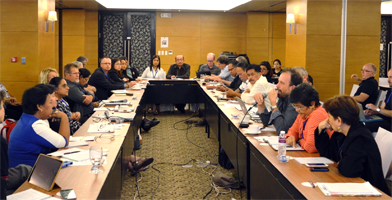 CEBU CITY – One hundred forty researchers, scientists, and private sector players participated in a final review meeting on the Horticulture Program on Fruits and Vegetables held recently.
CEBU CITY – One hundred forty researchers, scientists, and private sector players participated in a final review meeting on the Horticulture Program on Fruits and Vegetables held recently.
The program is a collaboration of the Philippine Council for Agriculture, Aquatic and Natural Resources Research and Development of Department of Science and Technology (DOST-PCAARRD) and the Australian Centre for International Agricultural Research (ACIAR).
A product of a long-term partnership between DOST-PCAARRD and ACIAR, the pgoram aims to address food security and improve farmers’ livelihoods in the southern Philippines and Australia. The program is expected to be completed in 2018.
The Program aims to optimize pest and disease management strategies and conduct studies on integrated crop management, soil and nutrient management, value chain improvement, and postharvest handling of selected fruits and vegetables.
Addressing pests and diseases
The research team has addressed Phytophthora infection in jackfruit by testing six Artocarpus species for tolerance and/or resistance to the disease. The species were also studied for graft compatibility with jackfruit. Results, however, are still subject for validation.
The research team has also addressed the issue on bacterial crown rot (BCR), which is said to be one of the most destructive diseases of papaya in southern Philippines and some parts of Luzon. They succeeded in identifying lines tolerant to BCR. Hybrids, which are tolerant not only to BCR but also to Papaya Ringspot Virus (PRSV), were also developed by the team.
In another study, the Program has also identified barriers to the adoption of recommended management practices against Fusarium wilt (FW) infection in banana. Barriers which include growers’ financial capability and the misconception that there is no effective way to control FW were corrected through information drives benefitting more than 550 participants.
Cost-effective, safe, and environment- and people-friendly substitutes to commonly used and hazardous fungicides in controlling blossom blight, anthracnose, and stem-end rot in mango were also provided through the program.
Trainings
More than 1,300 vegetable farmers had the opportunity to attend season-long trainings on Good Agricultural Practices with some of them even being given basic inputs like seeds, fertilizers, and seedling trays.
From the program, farmers were able to increase their profit by directly selling their goods to the consumers instead of passing through wholesalers or collectors. The project team who explored value chains of selected vegetables and fruits discovered that there are supermarkets, Class A wholesalers, and concessionaires who are willing to buy directly from farmers.
Other Program undertakings
Survey conducted under the program showed that vegetable farmers over-apply fertilizers to address low soil fertility. Besides its adverse effect to the environment, over-applying fertilizers also hurts the pockets of farmers. This is one of the concerns that the Program aims to address by teaching farmers the efficient and judicious use of fertilizers in order to potentially increase their profits, among many other methods.
The program will also be producing pest management practice guides for selected vegetables – tomato, eggplant, bittergourd, sweet pepper, lettuce, pechay, and cabbage – along with factsheets for the nature of key pests and diseases. These will be translated to local dialects like Cebuano, Waray, and Tagalog to enhance dissemination and appreciation of the recommended crop management practices.
After considering the outputs that have materialized from the Horticulture Program, future directions for collaboration and areas for further studies were tackled in a roundtable discussion among project leaders, DOST-PCAARRD, and ACIAR management.
Dr. Jocelyn E. Eusebio, on behalf of DOST-PCAARRD Acting Executive Director Reynaldo V. Ebora, expressed the Council’s gratitude to ACIAR for the collaboration and cooperation between Philippines and Australia through the ACIAR-PCAARRD Horticulture Program on Fruits and Vegetables.
